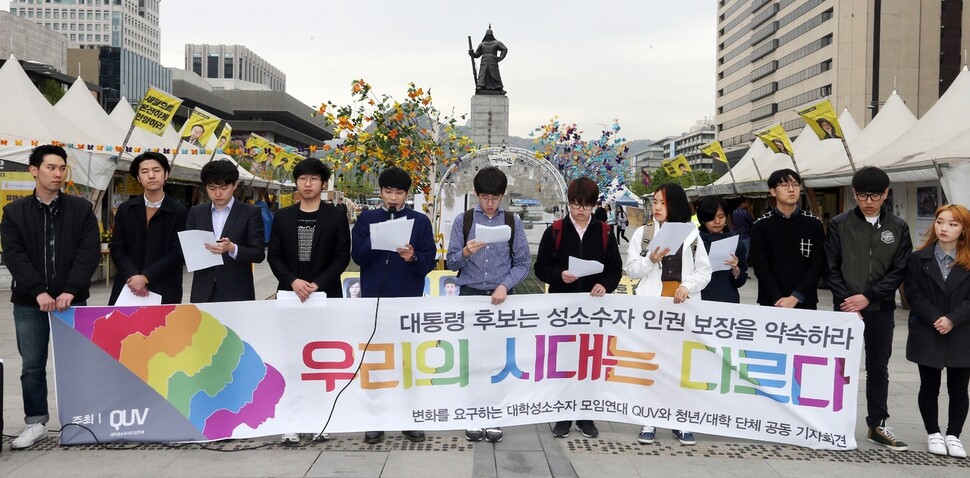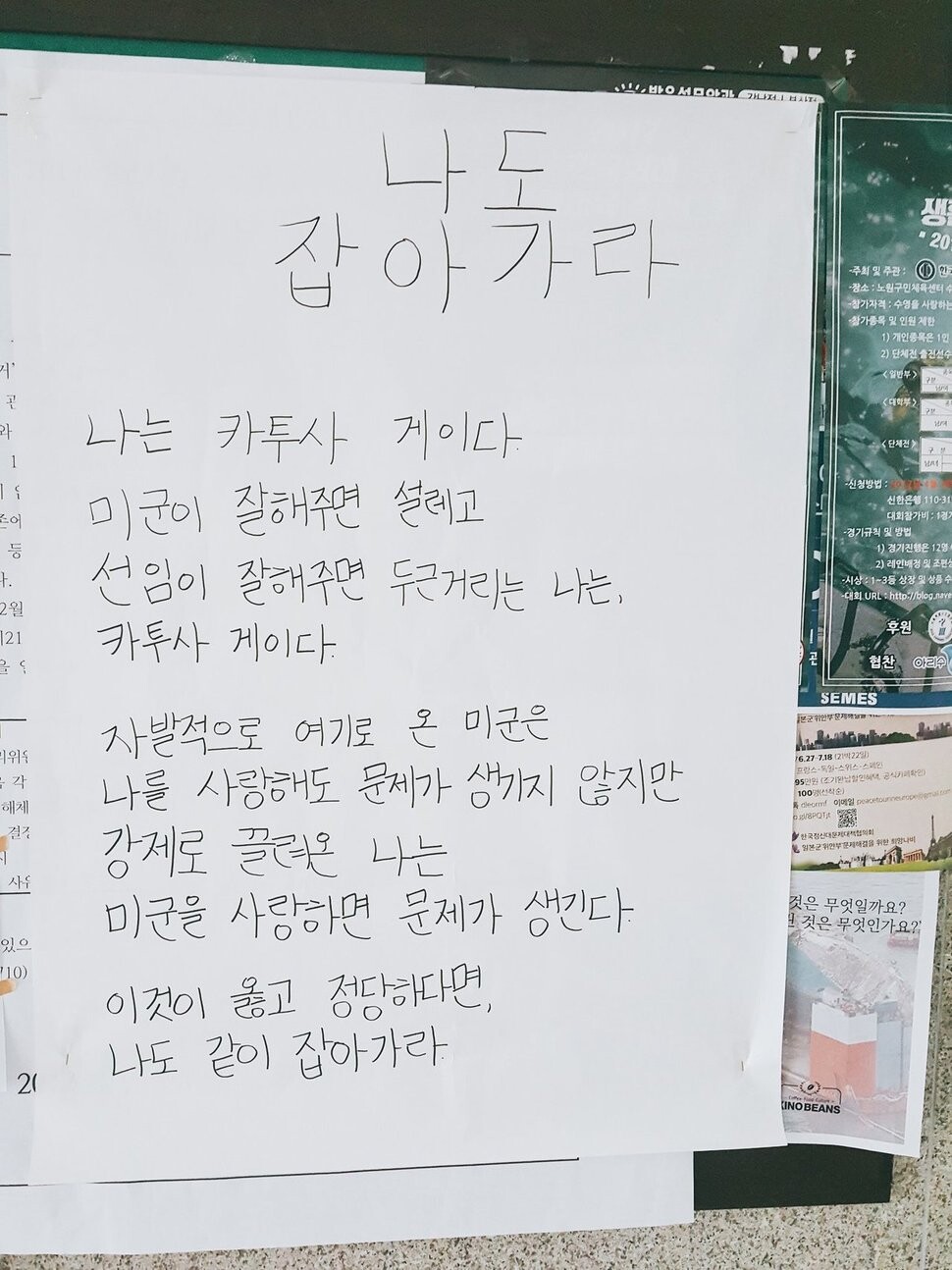hankyoreh
Links to other country sites 다른 나라 사이트 링크
Presidential candidates evasive on issue of LGBT rights

“I dream of a day when we can love and not be hassled. But the reality now is one where you get arrested for loving.”
These lines from Hwang In-chan’s poem “Forest of Figs” were quoted on a poster put up on Apr. 20 on the campus of Sogang University. “Arrest me too,” wrote a student who identified himself as a gay man who had not completed his mandatory military service. Other posters have been put up at the school by students identifying as “KATUSA Gay” and “Reserves Gay.” The campaign is a protest against the Army’s arrest of a gay captain for violating Article 92-6 of the Military Criminal Act by engaging in homosexual acts.
Amid the voices lamenting the “criminalizing of love,” some are also accusing major presidential candidates of keeping quiet on LGBT human rights issues while billing themselves as “human rights” or “feminist” candidates. Critics are arguing that even though the candlelight demonstrations have made LGBT rights a more important issue than in past presidential elections, the chief candidates are too concerned about appeasing homophobic conservative Christians to speak out.
LGBT groups have been more actively involved in this election than ever before. On Apr. 15, the gay rights group Chingu Sai held South Korea’s first-ever “gay summit,” with around 100 gay community leaders joining to issue a list of the “gay community’s demands for the 2017 presidential election.” The leaders demanded the candidates’ responses by May 1 on their demands, which included anti-discrimination legislation, legalization of same-sex marriage, guarantees on the establishment of different family types, and abolition of Article 92-6 of the Military Criminal Act. A list of 10 policy tasks for equal LGBT rights was announced in March by Rainbow Action, a group opposing discrimination against LGBT individuals. Specific demands included the enactment of a special law to allow people to undergo gender reassignment surgery more easily and a ban on the loaning of public buildings for events by people arguing that LGBT people can be “cured.”
The candidates’ positions on LGBT rights can be boiled down to whether or not they plan to enact anti-discrimination legislation, which would include provisions banning discrimination against an individual on the basis of his or her sexual identity or orientation. On Apr. 20, the South Korean chapter of Amnesty International released responses on eight human rights issues from candidates Moon Jae-in, Ahn Cheol-soo, Hong Joon-pyo, Shim Sang-jung, and Yoo Seong-min. Of the five, only left-wing Justice Party candidate Shim stated her intention to “pursue” anti-discrimination legislation. Conservative Liberty Korea Party candidate Hong said he “could not” pursue it, while the other three candidates avoided giving a clear answer.
Liberal Minjoo Party of Korea candidate Moon and moderate People’s Party candidate Ahn, who are respectively polling first and second in the race, expressed their opposition to discrimination but stressed the need for a societal consensus. Conservative Bareun Party candidate Yoo declined to answer.

On Mar. 20, officials with Moon, Hong, Ahn, and Yoo’s election camps all stated their opposition to enacting anti-discrimination legislation while attending the 19th Presidential Election Christian Public Policy Presentation, organized by the Holy Conference for the Evangelization of 80 Million Koreans and the Korea Christian Public Policy Conference. In a recent interview with YTN, Hong made homophobic statements about LGBT issues, saying he “hate[s] that stuff.” Of the registered candidates in the election, only two - Shim and Popular United Party candidate Kim Seon-dong - included LGBT rights in their pledges, including enactment of anti-discrimination legislation and abolition of Article 92-6.
Observers said the candidates’ reticent and avoidant approach on LGBT rights issues showed their failure to note changes in the South Korean situation. In universities, anti-LGBT positions have ebbed enough for several out students to become student council presidents since lesbian Kim Bo-mi was elected to the position at Seoul National University in 2015 - yet the candidates have failed to actively embrace the shift, critics charge. The same critics have also urged the candidates not to refuse their duty to protect LGBT rights over short-sighted efforts to win votes, but to be politicians who do not embarrass themselves before history.
“The establishment parties are all talking about ‘reform’ and ‘ending past vices,’ yet they never say a word about anti-discrimination legislation or LGBT issues,” said Na Ra, secretary-general of Solidarity for LGBT Human Rights of Korea.
“This is obvious from how they approach human rights.”
By Park Su-ji, staff reporter
Please direct questions or comments to [english@hani.co.kr]

Editorial・opinion
![[Column] Season 2 of special prosecutor probe may be coming to Korea soon [Column] Season 2 of special prosecutor probe may be coming to Korea soon](https://flexible.img.hani.co.kr/flexible/normal/500/300/imgdb/original/2024/0426/3317141030699447.jpg) [Column] Season 2 of special prosecutor probe may be coming to Korea soon
[Column] Season 2 of special prosecutor probe may be coming to Korea soon![[Column] Park Geun-hye déjà vu in Yoon Suk-yeol [Column] Park Geun-hye déjà vu in Yoon Suk-yeol](https://flexible.img.hani.co.kr/flexible/normal/500/300/imgdb/original/2024/0424/651713945113788.jpg) [Column] Park Geun-hye déjà vu in Yoon Suk-yeol
[Column] Park Geun-hye déjà vu in Yoon Suk-yeol- [Editorial] New weight of N. Korea’s nuclear threats makes dialogue all the more urgent
- [Guest essay] The real reason Korea’s new right wants to dub Rhee a founding father
- [Column] ‘Choson’: Is it time we start referring to N. Korea in its own terms?
- [Editorial] Japan’s rewriting of history with Korea has gone too far
- [Column] The president’s questionable capacity for dialogue
- [Column] Are chaebol firms just pizza pies for families to divvy up as they please?
- [Column] Has Korea, too, crossed the Rubicon on China?
- [Correspondent’s column] In Japan’s alliance with US, echoes of its past alliances with UK
Most viewed articles
- 1‘We must say no’: Seoul defense chief on Korean, USFK involvement in hypothetical Taiwan crisis
- 2[Column] Season 2 of special prosecutor probe may be coming to Korea soon
- 3N. Korean delegation’s trip to Iran shows how Pyongyang is leveraging ties with Moscow
- 4Korea sees more deaths than births for 52nd consecutive month in February
- 5Amnesty notes ‘erosion’ of freedom of expression in Korea in annual human rights report
- 6[Reportage] On US campuses, student risk arrest as they call for divestment from Israel
- 7[Editorial] New weight of N. Korea’s nuclear threats makes dialogue all the more urgent
- 8‘Weddingflation’ breaks the bank for Korean couples-to-be
- 9[Column] Has Korea, too, crossed the Rubicon on China?
- 10[Column] Park Geun-hye déjà vu in Yoon Suk-yeol